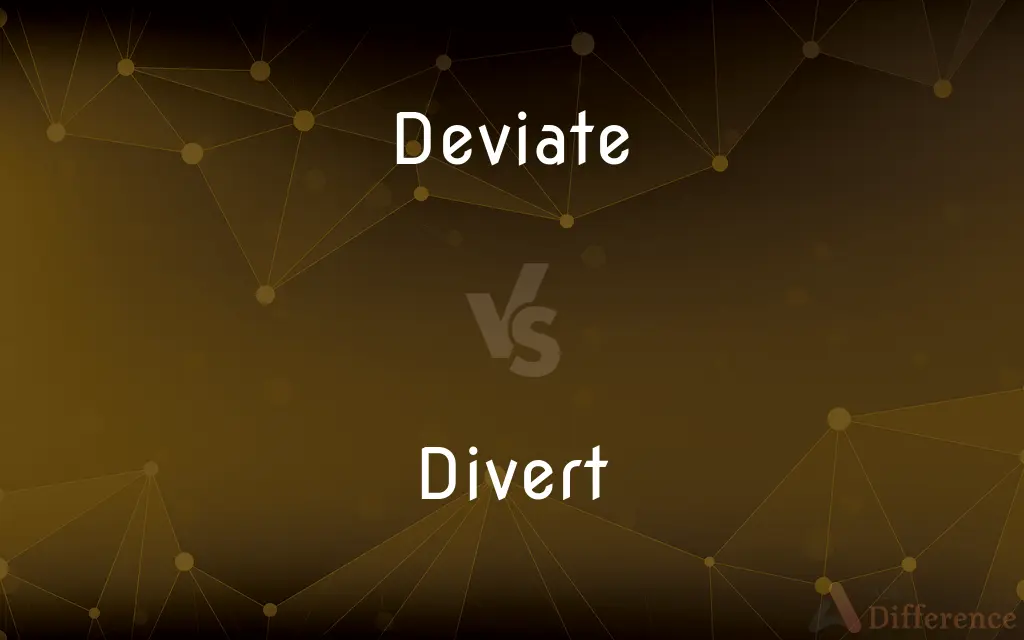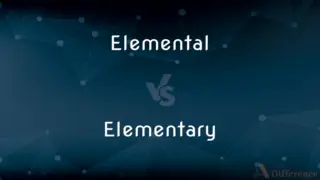Deviate vs. Divert — What's the Difference?
By Fiza Rafique & Maham Liaqat — Updated on April 17, 2024
Deviate involves departing from an established course or norm, while divert means to turn aside or away from a path.

Difference Between Deviate and Divert
Table of Contents
ADVERTISEMENT
Key Differences
Deviate typically describes a departure from a predetermined path or standard, implying a deviation from what is usual or expected. Whereas, divert refers to causing something or someone to change direction or focus, often intentionally to redirect resources or attention.
When someone deviates, it suggests a movement away from a norm or a usual behavior pattern. On the other hand, to divert involves an external influence that causes the direction or focus to change, such as diverting traffic or diverting a conversation.
Deviation can often have a negative connotation, particularly when it pertains to behaviors or practices that stray from societal norms. Divert, however, is generally neutral and is frequently used in contexts where redirection is necessary or beneficial, such as in safety or strategy.
In scientific or technical contexts, to deviate can mean to vary from a standard measurement or expectation. Divert in similar contexts might involve redirecting a flow, such as water or electricity, towards a different route or purpose.
Deviate is also used in statistical or research contexts to describe how data points differ from the average. Divert does not share this usage; instead, it is more about practical redirection in physical or metaphorical pathways.
ADVERTISEMENT
Comparison Chart
Definition
To stray from a standard, norm, or expected course.
To turn aside or redirect from one path to another.
Connotation
Often negative, implying undesirable variance.
Neutral, often involves intentional redirection.
Usage Context
Behavioral, societal, statistical.
Tactical, strategic, safety-related.
Influence Type
Internal (personal choice or variance).
External (caused by other forces or needs).
Example Scenario
A student deviating from academic integrity rules.
Emergency services diverting traffic after an accident.
Compare with Definitions
Deviate
To differ from the norm.
His views deviate significantly from those of his colleagues.
Divert
To alter the path of something.
The river was diverted through a new channel.
Deviate
To stray from the usual course.
The spacecraft began to deviate from its planned orbit.
Divert
To reroute resources or attention.
Funds were diverted to emergency relief efforts.
Deviate
To depart from established conduct.
She deviated from company policy by refusing to sign the agreement.
Divert
To turn from one direction to another.
Traffic was diverted to alternate routes.
Deviate
To go off course in navigation.
The ship deviated from its charted route during the storm.
Divert
To distract someone from a topic.
He tried to divert the conversation away from politics.
Deviate
To diverge from a set pattern in statistics.
This data point deviates from the mean.
Divert
To change the use or purpose of something.
She diverted her efforts towards a new project.
Deviate
Depart from an established course
You must not deviate from the agreed route
Divert
Cause (someone or something) to change course or turn from one direction to another
A scheme to divert water from the river to irrigate agricultural land
Deviate
Old-fashioned term for deviant
Divert
Distract (someone) from something
She managed to divert Rose from the dangerous topic of Lady Usk
Deviate
Old-fashioned term for deviant
Divert
To turn aside from a course or direction
Traffic was diverted around the scene of the accident.
Deviate
To turn aside from a course or way
Hikers who deviated from the main path.
Divert
To distract
My attention was diverted by an argument between motorists.
Deviate
To depart, as from a norm, purpose, or subject; differ or stray.
Divert
To entertain by distracting the attention from worrisome thoughts or cares; amuse.
Deviate
To cause to turn aside or differ.
Divert
To turn aside.
Deviate
A deviant.
Divert
(transitive) To turn aside from a course.
The workers diverted the stream away from the road.
Deviate
(sociology) A person with deviant behaviour; a deviant, degenerate or pervert.
Divert
(transitive) To distract.
Don't let him divert your attention; keep your eye on the ball.
Deviate
(statistics) A value equal to the difference between a measured variable factor and a fixed or algorithmic reference value.
Divert
(transitive) To entertain or amuse (by diverting the attention)
Deviate
(intransitive) To go off course from; to change course; to change plans.
Divert
To turn aside; to digress.
Deviate
To fall outside of, or part from, some norm; to stray.
His exhibition of nude paintings deviated from the norm.
Divert
To turn aside; to turn off from any course or intended application; to deflect; as, to divert a river from its channel; to divert commerce from its usual course.
That crude apple that diverted Eve.
Deviate
(transitive) To cause to diverge.
Divert
To turn away from any occupation, business, or study; to cause to have lively and agreeable sensations; to amuse; to entertain; as, children are diverted with sports; men are diverted with works of wit and humor.
We are amused by a tale, diverted by a comedy.
Deviate
To go out of the way; to turn aside from a course or a method; to stray or go astray; to err; to digress; to diverge; to vary.
Thus Pegasus, a nearer way to take,May boldly deviate from the common track.
Divert
To turn aside; to digress.
I diverted to see one of the prince's palaces.
Deviate
To cause to deviate.
To deviate a needle.
Divert
Turn aside; turn away from
Deviate
Having behavior differing from that which is normal or expected, especially in an undesirable or socially disapproved manner; as, deviate behavior.
Divert
Send on a course or in a direction different from the planned or intended one
Deviate
Be at variance with; be out of line with
Divert
Occupy in an agreeable, entertaining or pleasant fashion;
The play amused the ladies
Deviate
Turn aside; turn away from
Divert
Withdraw (money) and move into a different location, often secretly and with dishonest intentions
Deviate
Cause to turn away from a previous or expected course;
The river was deviated to prevent flooding
Deviate
Turn aside
Common Curiosities
Why might someone need to divert resources?
Resources are diverted to address changing priorities or emergencies that require immediate attention.
Can a person deviate without any external influence?
Yes, deviating often involves personal choices or internal circumstances leading one away from the usual path.
How is diverting different from deviating?
Diverting involves redirecting, often by external factors, while deviating is more about personal or internal changes from a set path or norm.
Do deviate and divert have similar effects in all contexts?
Not always, as deviate often has personal or negative implications, while divert is more strategic and neutral.
How do organizations handle deviations from standards?
They often review and adjust protocols or enforce rules to manage or mitigate deviations.
Can deviation be a positive thing?
Yes, in cases like innovation or creative processes, deviation from the norm can lead to breakthroughs.
What does it mean to divert a conversation?
It means to steer the discussion away from certain topics towards others, often to avoid sensitivity or conflict.
What does it mean to deviate from a plan?
It means to stray from what was originally intended or outlined in the plan.
What are the implications of deviating in a professional setting?
It can imply non-conformity or disobedience, potentially leading to disciplinary actions depending on the context.
Can diverting be beneficial?
Yes, diverting can be strategically beneficial to manage resources or focus effectively.
What is a common example of a diversion in traffic?
A roadblock due to construction causing traffic to be rerouted through alternative roads.
Is diverting always a physical action?
No, it can also involve intangible elements like attention or efforts.
In what situations might a device need to deviate from its programming?
During unforeseen circumstances or malfunctions that require it to operate outside of usual parameters.
How do engineers plan for water diversion?
They design structures and paths to control and direct the flow effectively, considering environmental and safety factors.
Can deviating from a recipe be a good idea?
Yes, especially in cooking, slight deviations can lead to personalized and sometimes improved flavors.
Share Your Discovery

Previous Comparison
Private vs. Special
Next Comparison
Elemental vs. ElementaryAuthor Spotlight
Written by
Fiza RafiqueFiza Rafique is a skilled content writer at AskDifference.com, where she meticulously refines and enhances written pieces. Drawing from her vast editorial expertise, Fiza ensures clarity, accuracy, and precision in every article. Passionate about language, she continually seeks to elevate the quality of content for readers worldwide.
Co-written by
Maham Liaqat













































